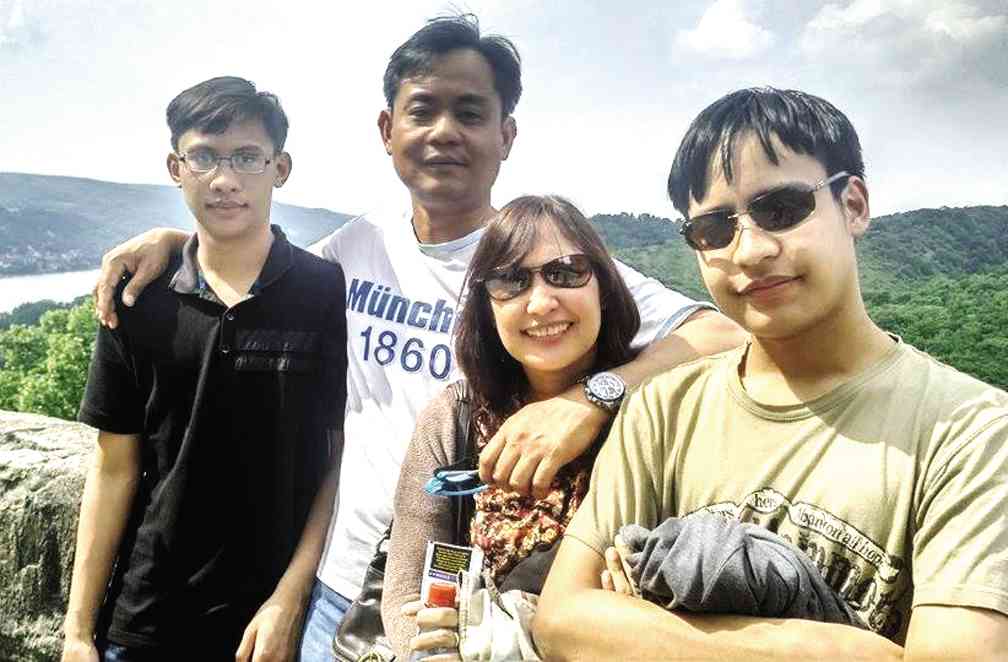It was 1992 when Marco Antonio M. Manuel, 49, left the Philippines to work as an aircraft maintenance technician in Saudia Airlines in Saudi Arabia.
He had to support his siblings and sick father. After helping his family, he got married and started a family of his own knowing it would be a long distance relationship.
Benjamin Sanchez, 60, left the Philippines in 1986 for Riyadh to work as a heavy equipment electrician at Al Jomaih Automative.
It was not his choice to leave, but his company, Construction and Development Corp. of the Philippines was shut down during the [Corazon] Aquino administration. He was among the hundreds of retrenched workers.
Wives raise kids
Manuel left the country again after his wedding. His firstborn, Jonas, now 20 was not even born when he left. He was also not present when Paulo, 18, and Troy, 15, his youngest were born.
“It was very difficult knowing your wife is in pain, giving birth while you are away. You don’t know what would happen to them,” Sanchez says.
“I owe a lot to my wife, Liana, in raising the three boys,” Manuel says.
Sanchez also agrees. “I trust my wife Rose in raising our kids,” he says.
Manuel’s job allowed him to travel frequently to Manila. But raising the kids was a challenge due to the limited time they spend together.
Sanchez has yearly monthly vacations during December, yet it is never enough for the time spent with his growing children.
The kids found their situation normal at first, since they grew up knowing that their fathers work abroad.
Technology

Lost Time Rosa Sanchez (wife of Benjamin Sanchez) and daughter Brenda during her graduation rites in 2014. One of the many memorable days Benjamin missed.
Luckily for Manuel, technology now bridges them together. He can monitor their situations and talk real time through Skype, chat and e-mail.
Sanchez recalls that during the earlier years, only letters and occasional long distance calls connected them. He has four children—Benjamin Jr., who died in an accident, Brian, Brenda and Byron. All are professionals and successful in their fields.
Being a father of three boys, Manuel regrets that he was not with them while they were growing up. Although they could tell him their problems through e-mails or phone calls, it is still different when the father is with them. There are things only fathers can explain and understand, according to him.
Sanchez says that he misses most the kisses and hugs of his children.
“Those moments of childhood are priceless. But we have to sacrifice for them,” says Sanchez.
Things changed when the kids were starting school. The absence of their fathers was noticeable especially during programs, meetings and family days where parents were almost always complete.
“I thought everything was OK. But there were times when they would ask me why I can’t just work in the Philippines,” Manuel says.
The kids yearned and craved for his presence during special occasions like birthdays and Christmas.
As they grew older, it was getting more difficult for them to see Manuel leave after a vacation. The kids and his wife sometimes visit him in Saudi Arabia or would spend vacation in other countries.
Better lives
Both Manuel and Sanchez explained to their young children the need to work abroad so they could study and have better lives.
“When my eldest was 9 years old he said to his siblings, ‘If you are not going to be serious with your studies, I will just become an addict.’ These words struck his siblings and since then, all of them became diligent students,” Sanchez says.
For Manuel, he fondly recalls the letters sent by his children. “One time my youngest son made a calendar when he was 5 years old counting down the days until my vacation time. He instructed me to put an X each day that passed so I would know how many more sleep I would have until I would see them again,” he says.
Even as absentee fathers, Manuel and Sanchez still keep the love and trust of their children.
“We have a close and normal relationship. They are not aloof or distant to me. We are just like brothers. We even share shirts, shoes and gadgets. We share jokes, we tease each other. But we also have serious moments, too. We also disagree on lots of things like music and food,” Manuel says.
Coping with loneliness
As OFW (overseas Filipino worker) fathers, coping with loneliness is the most challenging part. Many men and women end up cheating on their wives or husbands, which result in broken families and lost dreams.
Manuel always keeps constant communication with his wife and kids, and keeps himself busy with sports, like basketball. Oftentimes, he is sent by the company to other countries for training.
Sanchez says thinking of his children keeps him going. Until now, whenever he thinks of them, he still gets teary-eyed for the lost times and because he misses them.
Prayer is the best weapon to keep him sane, he adds. To make him busy, he joins the Filipino community in their activities like Independence Day or sports day.
Plans for the future
Being an OFW for more than a decade, Manuel does not know how long he would stay in Saudi Arabia because of the current political and economic situation in the Philippines.
Sanchez plans to retire four years from now. By then, he would have enough for his retirement. He also plans to start a business. Aside from that, he wants to spend time with his grandchildren.
“It’s my way of catching up with my children to make up for the lost time,” he says.
Given the opportunities in the Philippines, Manuel and Sanchez do not want their children to become OFWs.
Biggest supporters
“We do not want them to experience the difficulties especially the painful feeling of separation. Thinking of your family in the Philippines could either make or break you.
Even as absentee fathers, Manuel says, “You should always show your love and care to your children. Let them feel it. Be there for them and be their biggest supporter no matter where you are. Lastly, the best way you can show your love to your children is to love their mother.”
Sanchez, a veteran OFW, always reminds his fellow fathers abroad to just think of their families.
“You are away from them because you want to give them a good life.”


